It’s definitely a recurring pattern in anime at the moment, and it’s pissing me off. Moral equivocation is just not a good look – there’s plenty of headroom to allow for shades of grey without totally losing all perspective. For the record:
- It’s better to try and reason with intelligent beings than to attack every problem by reflexively destroying them.
- There’s no moral equivalency between the Jews and the Nazis, and using fictional “sins of the fathers” as a justification for present atrocities is not a mitigating factor in your own guilt.
- A “prosperity” founded on pacts with evil and exploitation of the weak is not a prosperity worth defending.
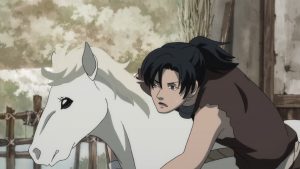 Yes, Dororo is an adaptation that has its problems, I won’t deny that. It’s the best series of 2019 so far but if I’m brutally honest, it’s pretty much muffed this whole moral argument for the entire second cour and beyond. And the most frustrating part is that every time it seems to be getting its thoughts sorted out and you think the corner has been turned (which happened yet again this week) it backslides into the same nonsensical equivocation it’s been mired in for the past three months. Frankly it really pisses me off – probably more so here because this show is so much better to begin with than the two I make reference to above.
Yes, Dororo is an adaptation that has its problems, I won’t deny that. It’s the best series of 2019 so far but if I’m brutally honest, it’s pretty much muffed this whole moral argument for the entire second cour and beyond. And the most frustrating part is that every time it seems to be getting its thoughts sorted out and you think the corner has been turned (which happened yet again this week) it backslides into the same nonsensical equivocation it’s been mired in for the past three months. Frankly it really pisses me off – probably more so here because this show is so much better to begin with than the two I make reference to above.
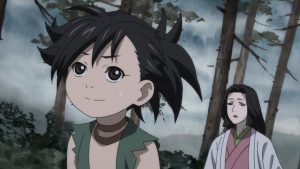 I never would have predicted I would be this gleeful when Hyogo and Mutsu died, but that’s what their “development” has wrought. Honestly, I was happy just to see them permanently shut up. “These never belonged to you to begin with” – seriously? Screw you, and Tahoumaru twice – you’re all full of it as far as I’m concerned, and so is Mom. It’s bad enough that they chose to follow the path they did – they literally made a deal with demons themselves in order to achieve their goals. They get not an ounce of sympathy from me – they made their bed, now they can rot in it. Whatever sympathy I have I’ll save for the foal – he and his mother were nothing but victims in all this.
I never would have predicted I would be this gleeful when Hyogo and Mutsu died, but that’s what their “development” has wrought. Honestly, I was happy just to see them permanently shut up. “These never belonged to you to begin with” – seriously? Screw you, and Tahoumaru twice – you’re all full of it as far as I’m concerned, and so is Mom. It’s bad enough that they chose to follow the path they did – they literally made a deal with demons themselves in order to achieve their goals. They get not an ounce of sympathy from me – they made their bed, now they can rot in it. Whatever sympathy I have I’ll save for the foal – he and his mother were nothing but victims in all this.
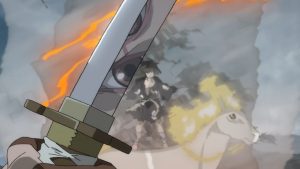 I really thought, just for a moment, when Dororo made her speech about becoming strong and taking what’s right by force because no one would give it to them that we’d passed through the tunnel and into the light. This whole sequence was easily the best part of the episode, including Biwamaru talking about the dangers of the path Dororo proposed, and the alternative – to give up all power and embrace mercy. That would indeed be the path of the Buddha. But as he (and Biwamaru is a priest mind you) says, you stop being human either way – because there’s no surviving in this world following that path, and Biwamaru knows it.
I really thought, just for a moment, when Dororo made her speech about becoming strong and taking what’s right by force because no one would give it to them that we’d passed through the tunnel and into the light. This whole sequence was easily the best part of the episode, including Biwamaru talking about the dangers of the path Dororo proposed, and the alternative – to give up all power and embrace mercy. That would indeed be the path of the Buddha. But as he (and Biwamaru is a priest mind you) says, you stop being human either way – because there’s no surviving in this world following that path, and Biwamaru knows it.
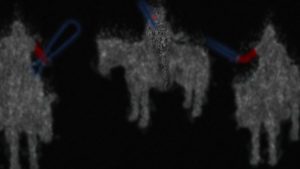 That Dororo as a series is capable of such profundity only makes the ache sharper when it goes ass over teakettle and loses the plot. What really galled me was Dororo herself losing her resolve – dammit, she’d figured it out, and she backtracked. It’s fine for her to want Aniki at her side (as she’s clearly decided to use her fortune to build up the peasantry and challenge the samurai class), but she has no right to tell Hyakkimaru to accept her as his “eyes and limbs”. His eyes and limbs should be his eyes and limbs. The one who comes closest to the truth here is actually Nuinotaka, who lays bare the hollow nature of the prosperity Daigo has “built” on Hyakkimaru’s sacrifice. But even she’s unwilling to fully commit to what she knows is right.
That Dororo as a series is capable of such profundity only makes the ache sharper when it goes ass over teakettle and loses the plot. What really galled me was Dororo herself losing her resolve – dammit, she’d figured it out, and she backtracked. It’s fine for her to want Aniki at her side (as she’s clearly decided to use her fortune to build up the peasantry and challenge the samurai class), but she has no right to tell Hyakkimaru to accept her as his “eyes and limbs”. His eyes and limbs should be his eyes and limbs. The one who comes closest to the truth here is actually Nuinotaka, who lays bare the hollow nature of the prosperity Daigo has “built” on Hyakkimaru’s sacrifice. But even she’s unwilling to fully commit to what she knows is right.
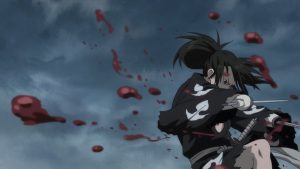 If nothing else, I can say I go into the finale with a sense of genuine uncertainty about what’s going to happen. Hyakkimaru – who’s dealing with the limitations of swords with no hilts when you have actual arms – defeating Tahoumaru and getting his eyes back (it was Midoro who did his work for him with his arms) would be the simplest solution, but that’s too simple for a series as intellectually convoluted as Dororo has become. I’m very uneasy about Jukai’s presence here (another character who should damn well know better) – I have a suspicion he’s going to be a vital cog in a denouement that drives me crazy. I love Dororo and I’m going to hold out hope that it miraculously nails the ending until every scrap of hope is stamped out, but hope is not expectation, and if I’m honest I’m not feeling at all optimistic.
If nothing else, I can say I go into the finale with a sense of genuine uncertainty about what’s going to happen. Hyakkimaru – who’s dealing with the limitations of swords with no hilts when you have actual arms – defeating Tahoumaru and getting his eyes back (it was Midoro who did his work for him with his arms) would be the simplest solution, but that’s too simple for a series as intellectually convoluted as Dororo has become. I’m very uneasy about Jukai’s presence here (another character who should damn well know better) – I have a suspicion he’s going to be a vital cog in a denouement that drives me crazy. I love Dororo and I’m going to hold out hope that it miraculously nails the ending until every scrap of hope is stamped out, but hope is not expectation, and if I’m honest I’m not feeling at all optimistic.


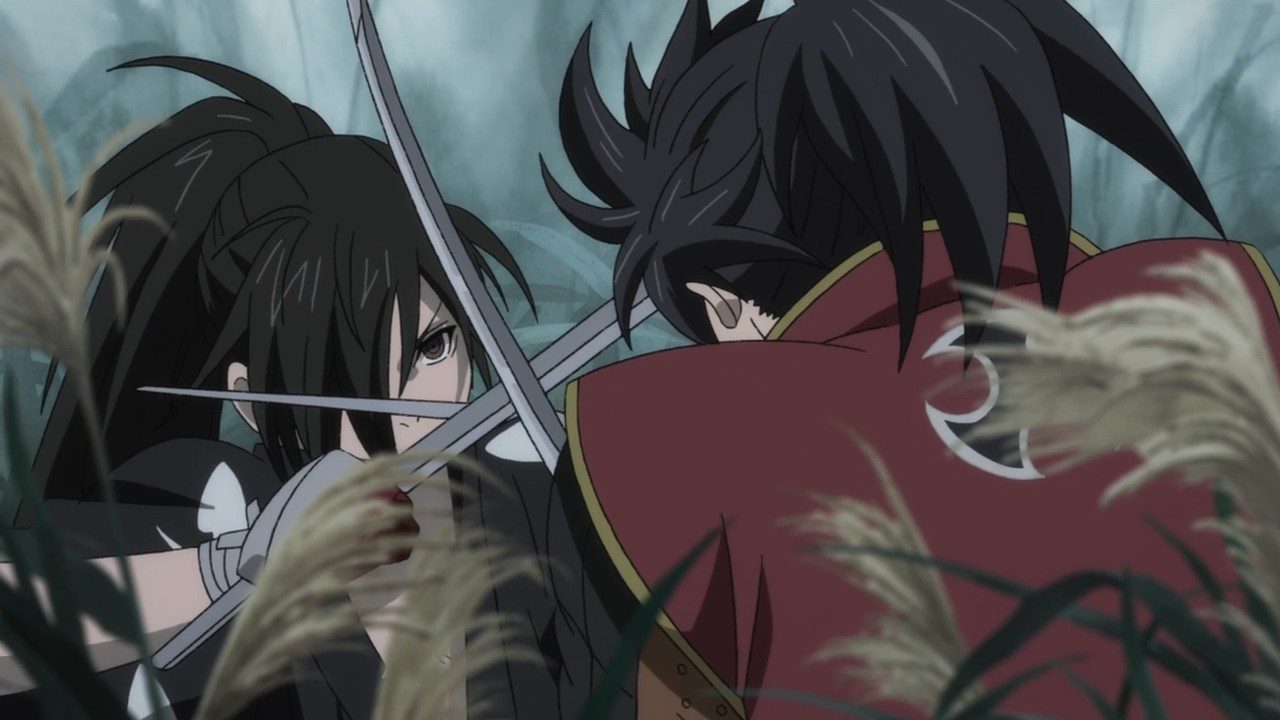
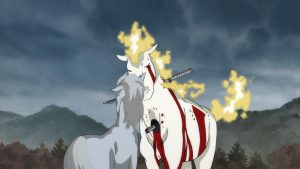
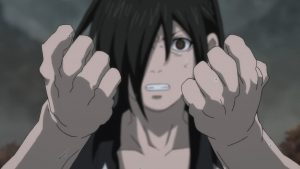
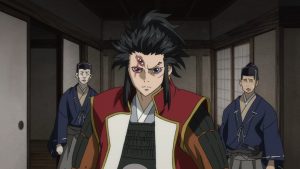
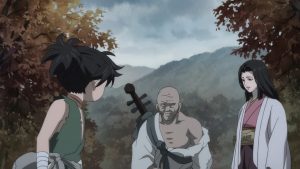
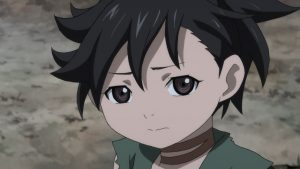
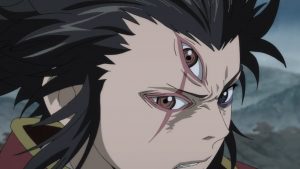
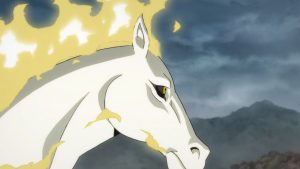
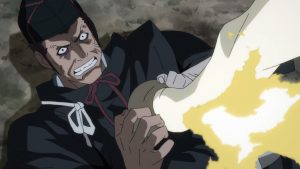
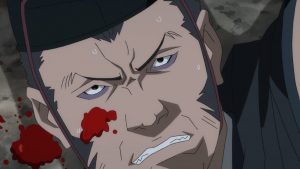
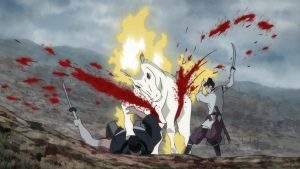
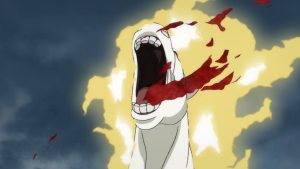
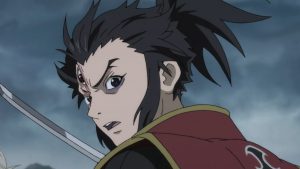
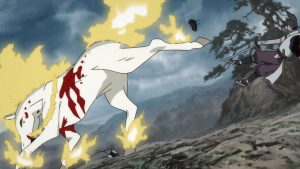
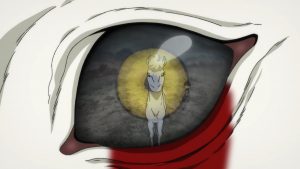
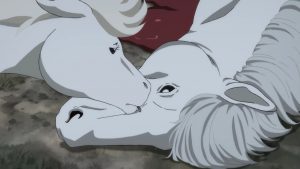
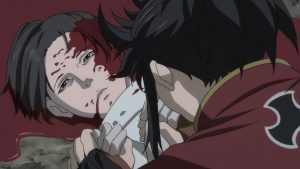
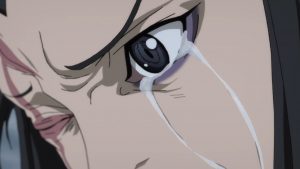
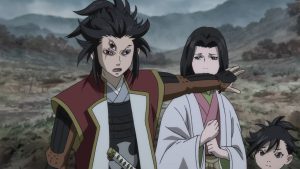
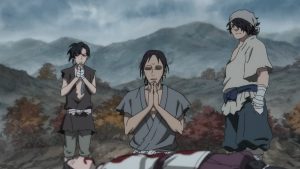
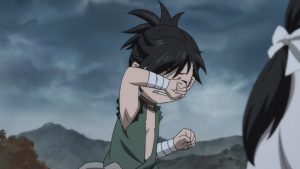
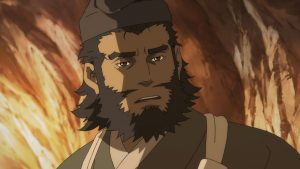
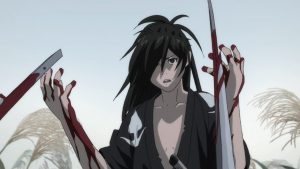
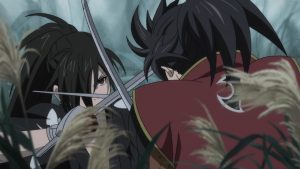
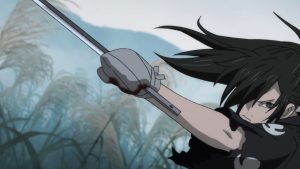
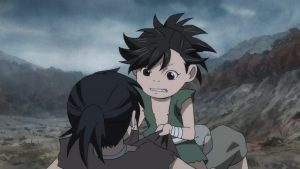
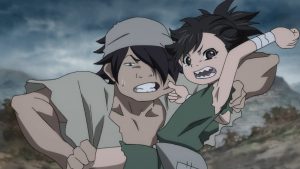
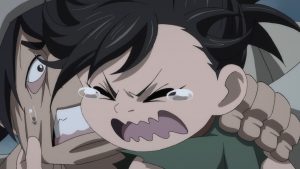
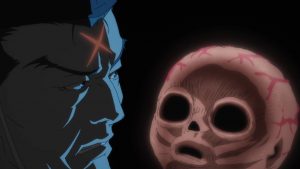
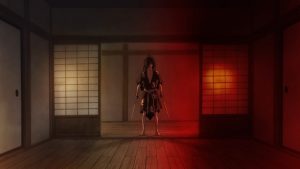
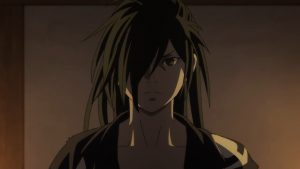
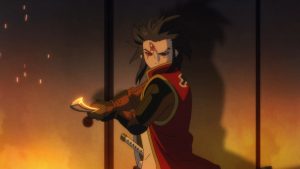
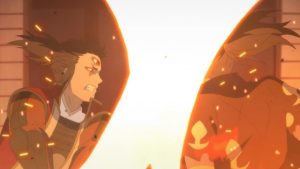
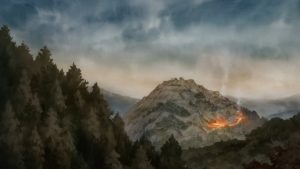
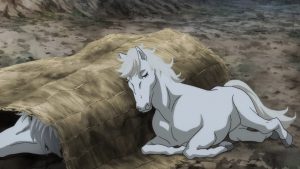
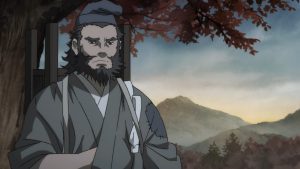
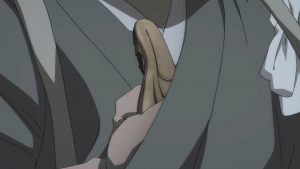
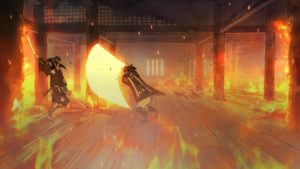
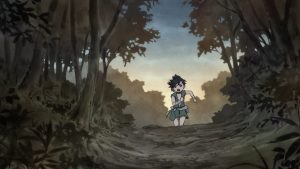
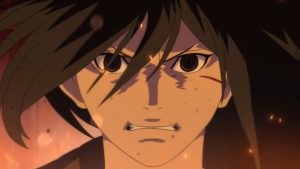
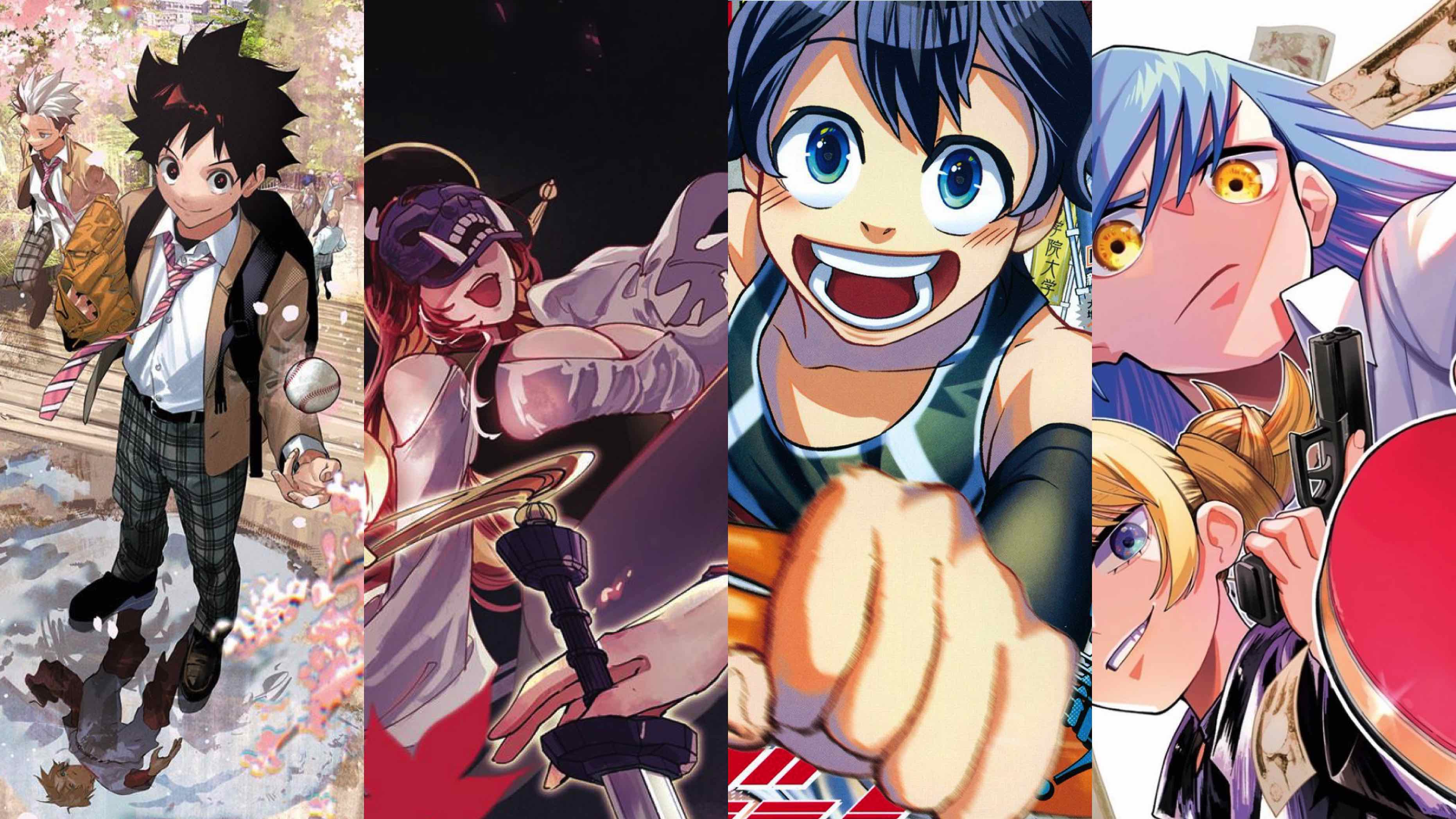
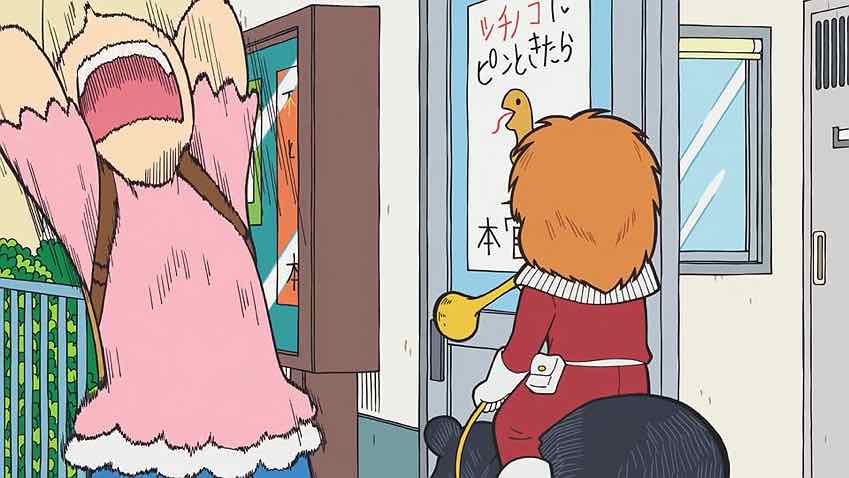
Gracie
June 18, 2019 at 10:29 pmAs I said in the other post after finally catching up with my backlog, I’m puzzled why for all intents and purposes the animators chose to go into an original direction instead of following the track laid by Tezuka-sensei. I mean sure there wasn’t enough original material, but adding original material to pad things through is one thing and gratuitously changing in a fundamental way what the source material was about is another thing.
This whole from victim to monster narrative leaves me rather cold. Same with the end justify the means (Daigo’s prosperity at the cost of his own child’s body) or the necessary sacrifices nonsense. It’s cute that it’s always the oppressed and the powerless who have to sacrifice things for the greater good.
Guardian Enzo
June 18, 2019 at 10:42 pmWell, to be fair I think it’s generally agreed that Tezuka’s original manga is kind of a mess. It almost seems as if he lost interest in it himself at some point. I think there had to be some major changes made, and not just padding it out.
The funny thing is, I thought at first the whole concept of those with a conscience having to make sacrifices for the greater good while those without one revel in their wealth and power was going to be the central theme – I expected that to be the whole point. It sure doesn’t seem to have turned out that way.
Gracie
June 18, 2019 at 11:16 pmBut the ending at least wasn’t so nihilistic as what we’re getting here. It’s like they built Hyakkimaru just to tear him down. It’d have been one thing if they focused on the moral degradation of Tahomaru while fighting his brother who’s only trying to right a wrong. But they went ahead and thrown one of their protagonists under the bus with what they pulled last week and rather needlessly too.
It kinda reminds of Dany in GOT, but at least Dany had a record of immolating people prior to turning outright genocidal albeit rather out of the blue from a narrative perspective. Whereas here, until last week, none of his actions had been reprehensible. He didn’t kill gratuitously. He led that spider-lady demon go.
TorahSylphwind
June 19, 2019 at 1:28 amHm. I thought it was interesting that the only blood Hyakki got on his hands was his own, when he had to hold his blades bare-handed because Tahoumaru was mercilessly beating on him. Also, I think Midoro demonstrated the motherly love Hyakki’s mom should have. Yes. It meant ripping a horrible man’s head off. Did it make her a monster? No. She was just there for her foal (and for Hyakki) right to the end. That a horse is a far better mother than either Hyakki’s mom or Jukai is…rather pathetic. And Dororo…sigh.
JJ
June 19, 2019 at 1:56 amHonestly, I’m feeling just as bad about this as I was with Bahamut – yes that was a much more idiotic turn, but this series is much better, which will make the inevitable fall that much more bitter.
Not got much more to say, I agree on the other counts as well. It’s going to be a frustrating week’s worth of viewing.
Nadavu
June 19, 2019 at 2:00 amAnother stellar episode for me. And I think the show came as close as possible to say clearly that Hyakki’s quest is just without losing the complexity of the moral dilemma (and it is a dilemma. Just like the peasants said to Dororo. If anyone would tell me that he would not even entertain the thought of sacrificing some dude he never met in order to save everyone he knows and loves, even for a limited amount of time, I’d be very suspicious of him.)
What bothered me is that when Hyakki enters the castle, Tohoumaru is holding a big-ass katana while two more swords are strapped to his waist. Presumably, those would be two shorter blades for indoor fighting. And yet, not only does he opt to use the longest of the blades, he then makes a point of telling Hyakki how handicapped he is to have long arms while fighting inside.
Color2413
June 19, 2019 at 4:10 amI’m with Enzo on this. Certainly, from a Western point of view, Hyakki has fought hard against a terrible injustice (caused a corrupt deal that he never had any say in) and he deserves to get his body back. However, from a Japanese point of view I expect that the issue is not so clear-cut because of the Japanese emphasis on the harmony and supremacy of the group over the individual” “The needs of the many outweigh the needs of the few.”
But as far as I’m concerned, “Dance with the Devil, and the Devil will get his due.”
Path
June 19, 2019 at 7:18 amI dropped this show back at episode 15, and it was loosing me well before then too, but I never stopped peaking in from time to time to see what you had to say about it. I am curious though, for a while, this show and Mob Psycho 100 season 2 were about equal for you (if I remember correctly) before Dororo pulled out ahead as being “the best of 2019”. but In recent, you have found much frustration with this show; yet, you still claim it to be the greatest show of 2019 so far. Why is this? What about this show makes it stand on top for you, especially when compared with shows that you thought were great and also had no major problems with? (such as Mob Psycho) I’ve just been curious about this for a while.
Guardian Enzo
June 19, 2019 at 12:15 pmA fair question. I just feel like at its best this show has been better than Mob (frankly I didn’t find the last couple of arcs that interesting – the show just got too battle heavy). And despite the obvious struggle it’s having with the moral equation, the execution is still excellent most of the time and I’m still totally invested in the two main characters.
Wangwang
June 19, 2019 at 10:45 amActually, the “sin of the father” is not the biggest defense for the Nazi. The biggest defense for the Nazi is “someday Jew will rule the world, if they have not already”. And whether you agree with that line of thinking or not, you have to admit that it’s nearly impossible to not kill Jew IF you believe in that.
Wangwang
June 19, 2019 at 10:52 am“A “prosperity” founded on pacts with evil and exploitation of the weak is not a prosperity worth defending.”
That is morally correct, but in reality the people who grew up in that prosperity will try their hardest to defense it. After all, America is a country build by slaves, but I don’t see American say that their country should be destroyed.
Wangwang
June 19, 2019 at 11:06 amMy mother is a great woman. She help a lot of people. And yet she agree with Trump Wall. Why? Because according to her, it is completely unfair when the Mexican can just cross the border illegal, and become American for free, when many people in faraway country have to spend a lot of money to become American legally. The fact that the Mexican do that that to escape their hard life in Mexico doesn’t matter to her.
Wangwang
June 19, 2019 at 11:14 amIn fact, if a demon appear and tell people: give me one of your child, and your lineage will be prosper for 100 years, I think many people, especially poor people, will take that offer.
Wangwang
June 19, 2019 at 11:24 amI’m not saying that you are wrong. Hyakkimaru has every right to want his body back. Like you said, it’s his body. But the prosper that “built” on Hyakkimaru “sacrifice” is also not hollow. To the people who live in that prosper, it’s very real. Telling many people to give up their comfort life just for one person is very hard, i presume.
Wangwang
June 19, 2019 at 11:26 amIt’s even harder when you consider the condition of society in Dororo.
Guardian Enzo
June 19, 2019 at 11:53 amPlease try to consolidate your comments in future, thanks. When you post every paragraph as it’s own comment it makes the site a lot harder to navigate.
Wangwang
June 19, 2019 at 12:18 pmI blame the lack of the edit button. 🙁
Yukie
June 19, 2019 at 4:06 pmI actually have a little more faith in Jukai (I have an idea of what he’s holding), but at the same time, I’m not sure the end scenario in my head will completely play out, since the show seems to be going in the direction of Hyakki turning into a complete monster (which he hasn’t yet, IMO, in this episode). Still, I’m holding onto the possibility that Hyakki will prove himself.
Nui, on the other hand, I’ve completely lost faith in. Here I was hoping she’d redeem herself, but alas, she’ll continue to lament her powerlessness.
Karsa
June 20, 2019 at 1:57 amFor me Hyakkimaru is 100% in the right. The way this show is trying to sell its moral dilemma just isn’t sitting well with me.
Sure I can understand that Tahomaru, Daigo, and the rest of the citizens would want to stop Hyakki. I mean if I’m one of those peasants, with a family dying of hunger, I would probably root for Hyakki’s defeat. But I’ll never pretend that it isn’t evil. There’s no moral gray area here.
What really grates me is the self-delusion of the characters (and possibly of the show itself). Just admit that you are stealing from Hyakki, that you’re doing him a great evil injustice, for the sake of things dear to you.
Perhaps Tahomaru and his 2 attendants says what they say in an effort to convince themselves, so that they can fight mercilessly and act decisively, but I never saw the show give any indication that that’s the case.
As for the mother and Dororo, they just piss me off. If you can’t decide who to side with, then please just stay the hell away. I don’t think anything the mother ever said or did actually helped Hyakkimaru’s emotional state in any way.
Marty
June 20, 2019 at 4:29 amHonestly, I find stories debating the merits of moral relativism to be fascinating if they’re both well-told and if both sides have their own merits. However, this isn’t morally relative, Daigo shit the bed on this one.
There’s a difference between making terrible decisions and sticking by them, and encouraging your son to continue making said decisions.
Daigo’s solution to the problems of his lands is really more of a band aid than an actual cure. Sure, the farmlands are bountiful and certain areas enjoy relative prosperity, but the fact remains that poverty and general injustice haven’t left his lands, and the added bonus of Demons running amok almost offsets the gains Daigo’s land made.
It kinda feels strange that the show encouraged Hyakkimaru’s hunt for the demons early on not only as the means by which to restore his body, but as a way of helping the population by not letting them get eaten by demons. Now, the show seems to portray Hyakkimaru’s journey as self-destructive.
Now, I understand the idea that killing people is different than killing demons, but these aren’t innocent souls, they know his mission, they know WHY he’s doing it, and yet they oppose him (for crying out loud, they’ve made deals with literal demons), and I’m suppose to see THEIR point of view as valid?
Kim
June 20, 2019 at 8:32 amI don’t know how this series is going to end but personally this latest episode made me feel a bit more comforted
Note that Nui literally came to the conclusion that it was wrong for them to prosper on Hyakkimaru’s suffering. Dororo also didn’t agree with it.
I also don’t see the ending as Nihilistic as someone mentioned above. I do not think Hyakkimaru is going to turn into a demon because Dororo believes in him and I believe Dororo knows Hyakkimaru best
Do I think Hyakkimaru will end up with his body back. Possibly not (albeit I think he will briefly get it all back). I know that is upsetting because we all want Hyakkimaru to have his body back but that isn’t what makes Hyakkimaru human. And I think that is the important point. For me Hyakkimaru’s relationship with Dororo is what made him human not his body parts. As long as Hyakkimaru has Dororo he is still human.
I know I said I feel a bit more conformed after this episode that doesn’t mean I am not nervous about the ending. I love this series so much that yes I am worried the ending will leave me cold. I want Hyakkimaru and Dororo to have a good ending. But I am open for that good ending to not be Hyakkimaru getting his body back as long as he retains his humanity and the love he has for Dororo.
Jen
June 23, 2019 at 3:21 amI just discovered this series and binged it up to Episode 23 for both the gorgeous art and the astonishing storytelling, and I’ve enjoyed reading your takes on it while waiting for the denouement. There are a couple of comments I’d like to make re some of your concerns.
First, I fully expect to be disappointed in the ending – and probably horribly depressed by it as well – because this is a Buddhist-themed anime. Buddhist philosophy as typically expressed in anime is so grindingly negative about life and human nature that it’s practically Calvinism, in my opinion. This is why I usually prefer Shinto-themed anime. There are several paths I imagine this ending could take, but I respect the writers so much, I don’t want to speculate about it. I’m just bracing myself to admire the dramatic skill, feel the feelings, and amuse myself later by privately rewriting it in notes I will never show anyone, Monday Morning Quarterback style.
Another reason I think a lot of non-Japanese viewers will be disappointed, no matter what ending we get, is the cultural difference between how we in the West venerate the individual and justice for persons, and how Asian societies venerate the group and self-sacrifice for the good of all. Because this is a tragedy, there is no way a western audience is going to feel satisfied that justice is done for Hyakki. Besides, even in western tragedies, the hero fails due to his own inherent flaws or mistakes, so seriously, let no one expect smiles at the end of this. That would arguably be an even worse ending. I will faint dead away if this anime Pinocchio does not end like anime Hamlet.
As to the moral grayscale of the story arc, I am also frustrated by the degree to which all the characters harp on and on about Hyakki turning into a monster if he dares to claim personal justice for himself and put an end to a corrupt and evil system that everyone else has been blithely dining out on at his expense for 16 years. But that might just be because I’m an American and not a Buddhist. There’s a degree to which I don’t “get it.” But that’s fine. I don’t need to “get it” down to every point. However, I don’t agree that the story is being all that one-sided against Hyakki and for the status quo. I think Hyakki’s mother has functioned as a Cassandra character for several episodes, in predicting to her husband that their land’s days of prosperity are ending. She doesn’t say this in terms of “if Hyakki gets his body back.” No, she just says it’s ending. The reality they built was corrupt from the start, and now it’s coming apart, nothing is going to save it, everyone is going to have to pay the piper, and anyone who thinks different is living in denial. There’s a subtle degree to which she echoes the sentiments of many of the western viewers in re justice for Hyakki. Whether Hyakki lives to feel his justice or not, there’s a lot of justice to be handed out in this story. I said I wouldn’t speculate about the ending, but regardless of who survives it, I can see a more hopeful, if not essentially different, future dawning in the final frames, in the viewpoint of Dororo or peasants who share her survivor’s mindset and who will inherit the world in the aftermath, like the rice farmers at the end of The Seven Samurai. Fingers crossed because that would cut against the fatalism of all Buddhist anime.
I also think the series has done a good job of highlighting the hypocrisy of Daigo and other “establishment” characters (village leaders, soldiers, etc.). I don’t think they are being presented as in the right at all, but rather as self-serving, excuses-making, unethical exploiters. Perhaps it is only the traditional samurai-era expectation that a decision made must be carried through to the hilt – with Hyakki’s mother choosing the route of the lord’s wife over the route of the mother up to now, and Tahou choosing the route of familial duty over his own sense of right and wrong – that makes it seem to us like we’re supposed to agree with them. Rather, maybe we’re supposed to see them as tragic characters as well.